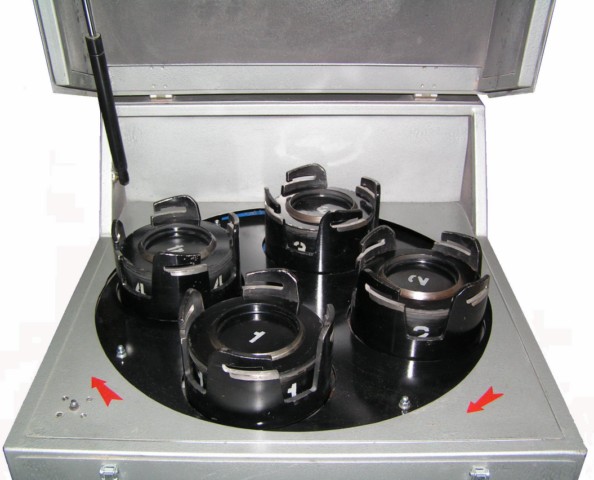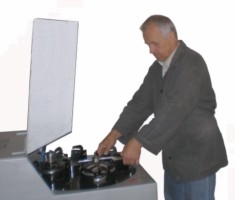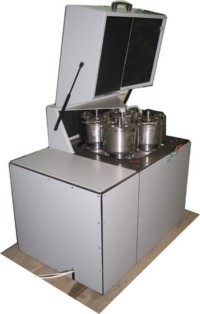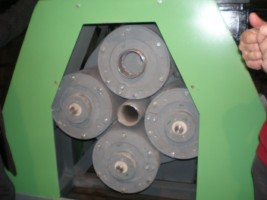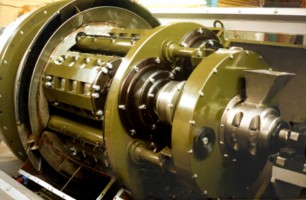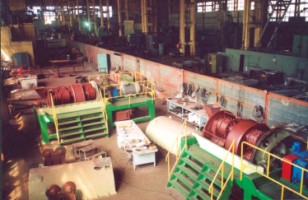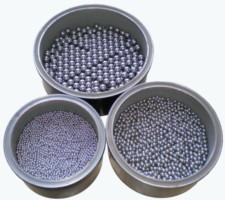Planetary mills
At present planetary mills of high accelerations providing fast and efficient milling of various materials on industrial scale are commercially available in Russia. The principle of planetary mills performance Planetary mills are usually provided with 3 or 4 jars (drums) rotating around the central axis and simultaneously around their own axes in the opposite direction (like the planets rotate around the Sun). Material and milling bodies (usually balls) are loaded into the jars. The treated material particles undergo multiple collisions with the grinding media and the jar walls. The efficiency of planetary mills is the result of the high kinetic energy of grinding media. High velocity of moving milling bodies exerts high stress on the activated material.
Comparison with conventional milling equipment During grinding in a conventional ball mill, milling bodies fall down under the action of gravity. Gravitational acceleration is 1 G. In planetary mills centrifugal motion of jars with high accelerations is applied. Acceleration in laboratory-scale planetary mills reaches 28-60 G and higher values. Acceleration in industrial-scale planetary mills is 20 G. It is clear that forces influencing
the treated material in planetary mills more than tenfolds exceed forces imposed on the material in conventional milling equipment. The milling process carried out in planetary mills is faster and more efficient. For instance, during the production of fine WC powder it is an usual practice to mill tungsten carbide powder in a ball mill for 130 hours. In a planetary mill characteristic time of WC milling down to submicron level ranges from 15 to 30 minutes. The energy density of a planetary mill can be estimated by dividing its capacity by the volume of the working chamber. The energy density of planetary mills can 1000 times exceed the corresponding parameters of conventional ball mills. Planetary mills of high accelerations have higher energy densities in comparison with attritors, vibration grinding mills, jet-type mills, and desintegrators. Planetary mills of foreign producers are known on the market of laboratory equipment. Accelerations actually used in these mills usually do not exceed 7-8 G. The industrial-scale analogs of such mills do not exist. In the scopes of the ”Activation” project the efficiencies of milling in various laboratory-scale planetary mills were compared. Tungsten carbide particle size of 120-180 nm was attained 18-30 times faster in a planetary mill available from Russian producer in comparison with an analog commercially available from foreign producer. It is even sometimes discussed in the relevant literature that it is principally impossible to scale up planetary mills and to create the equipment of higher throughput rate. Indeed, the task of continuous loading and unloading a material into and from the jars rotating at high speed is technically very complicated. Nevertheless the problem was successfully solved and there is a wide dimension type range of commercially available industrial planetary mills produced in Russia.
Batch-type and continuous planetary mills If we deal with a planetary mill of periodic action, it is necessary to load milling bodies and the treated material in jars, install the jars in a fastening device, perform milling and discharge the powder obtained. In the mills of continuous action, as follows from their name, loading and unloading processes are effected in a continuous manner. There are commercially available batch-type planetary mills where the volume of a material loaded in one jar ranges from 75 ml up to 2.4 l. Usually there are 4 drums in one mill. Milling is fast enough and throughput rate can attain 36 kg/h. High-performance mills use accelerations up to 20 G. In the autogeneous grinding mode, the coarseness of initial material can be up to 60 mm for the largest batch-type planetary mill available. The main task of such mills is to perform small production programs in industrial conditions. They are used in the fields of sample preparation for physico-chemical analysis, mixing of components, mechanical alloying, production of fine and superfine powders for powder metallurgy, in small-scale production of pigments, abrasive materials, pharmaceutical preparations, selective milling for exploration of precious metals and diamonds, and activation of ore concentrates before hydrometallurgical treatment.
Milling of different materials has its own specific features. Some materials require special linings and an inert gas atmosphere. Commercially available continuous-type planetary mills have throughput rate in the range from 20 kg/h to 12 tons/h for the powder less than 10 mcm. They combine both high throughput rate for superfine powders and compactability. The specific throughput rate of planetary mills is from 10 to 30 times as great as one of conventional milling equipment. The drawbacks of conventional ball mills are well known: large overall dimensions, huge energy consumption, and low milling efficiency. Planetary mills do not require a heavy and expensive foundation. Their operating costs are several times less than for conventional milling equipment.
Industrial-scale dry milling supposes using of processing lines including (besides a mill) classifier, filter, and fan. Organization of large-scale and efficient production of fine nanostructured powders requires the creation of technologies based on planetary mills. These planetary mills have performance specifications which allow to eliminate several stages of crushing and milling used in conventional process design. Under the influence of impact of milling bodies moving at high accelerations the physico-chemical properties of powders are being changed as a result of intensive mechanical treatment. Mechanically activated particles have increased reactivity and are more reactive compared to particles obtained by other methods.
Mechanically activated ceramic powders can be sintered at lower temperatures compared to non-activated ones. Using milling equipment of a new type it is possible not only to decrease particle size but also to obtain mechanically activated powders having new physico-chemical properties. Planetary mills have wide perspectives of application in the fields of powder metallurgy, mechanical alloying, and development of dispersion-strengthened alloys. As a result of mechanical alloying of aluminium-based alloys (the “Activation” project) the whole process was accelerated, the high level of coverage by metal of reinforcement solid particles, high adhesion, and proper solid phase distribution in metallic matrix were attained. The results obtained along with the analysis of literature data without any doubts demonstrate the high potential of planetary mills applications in various fields where fine grinding is required (fine grinding is one of the most expensive process stages in large-scale production).
The main fields of planetary mills applications: - powder metallurgy; - catalysts production and recycling; - production of pharmaceutical preparations; - milling of pigments; - milling and cladding of abrasive materials; - activation of ore concentrates before hydrometallurgical and pyrometallurgical processing; - treatment of solid wastes; - production of construction materials and dry pack mortars; - ceramics industry; - chemical industry; - mining industry.
|

Active-nano (Andrey V. Petrov)


